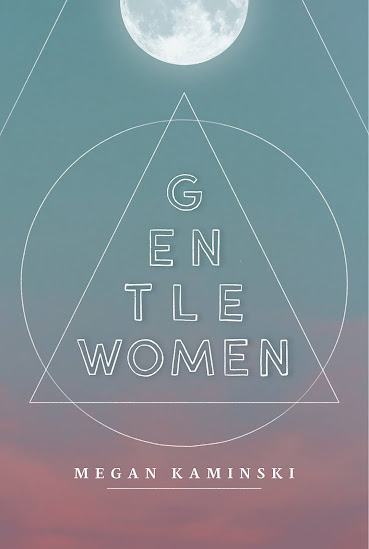the lost girls
this is how we disappear
walking without hesitation
into darkness —
sacks
filled with glass bottle and feather
boots lifting from gravel
forward to song and snow drift
stars pave paths through
commodity wheat
trestle the cold in cottonwood
gambrels
these verdant hills, our new
mother
grain elevators hold
tight and tidy to
cloud-begotten fields
a daughter who never
returns never disappoints
leaves behind empty rooms
and notebooks
filled with sentences writing
books to
barricade doors silent in
sleep each night
I’m pleased to see a new poetry collection by Lawrence, Kansas poet Megan Kaminski, her Gentlewomen (Blacksburg, VA: Noemi Press, 2020), following Deep City (Noemi Press, 2015) [see my review of such here] and Desiring Map (Atlanta GA: Coconut Books, 2012) [see my review of such here]. Back in 2014 for Touch the Donkey, she spoke on the manuscript, still very much a work-in-progress:
My second book, Deep
City, is going to be coming out next year—I’ll have an official announcement
soon—and “Sister // Deer” is part of my new/current project Gentlewomen.
The poems in Gentlewomen play around with and revise gendered domesticity
through a re-imagining of the voices of female allegorical figures,
specifically Natura, Providentia, and Fortuna—giving voice to particularly
feminine desires and appetites. The poems consider the kinds of wildness and
incivility that arise from a rejection of various forms of cultivation. They
also celebrate feral longings and weedy appetites as counterforces to productivity
and as a means of reclaiming the wild. As I’ve been working on the project,
I’ve become particularly interested in sisters and the idea of sisterhood, in
the relation of the allegorical figures to each other and also the relations of
the various other women who inhabit the book—lost girls, icy mothers, drowned
and ghosted children, and also the two sisters who get their own long poems,
“Dear Sister” and “Sister // Deer.” While “Dear Sister” and her
correspondences (there’s an excerpt here at Two Serious Ladies) live
very much in the suburban domestic sphere, “Sister // Deer” rejects that
world. While I think of her poems very much as spoken utterances, as a kind of
response to her sister, they are also language eroded through a kind of
self-erasure. A resistance to pleasantries and the types of usefulness and
meaning that create the language of her sister. The poems aren’t conventional
utterances, and they aren’t the type of responses one might expect to
correspondence, and “Sister // Deer” herself perhaps isn’t quite human.
Structurally, Kaminski has long favoured the book-length lyric suite, and Gentlewomen is composed in five sections—“NATURA,” “DEAR SISTER,” “PROVIDENCE,” “DEAR SISTER” and “FORTUNA”—as her poems, as her three characters, weave in and around each other as lyric ripples, echoes and repeated visions, composing poems with repeated titles that intertwine with ecological concerns, the natural world and its impulses. Kaminski has long composed poems around ecological concerns as an ongoing ecopoetic, but this collection allows a human component to blend in alongside, providing two threads of threatened safety that can be worked against through collective action and attention. This is a book of sisters, possibly playing off the ancient Greek idea of the three fates (shown in different forms such as Macbeth, as well as Neil Gaiman’s The Sandman), as hers adhere to the possibilities of what the world has to teach: “She put her ear to the earth / she put her ear to the earth and listened / she put her ear to the earth and listened to what was below / she listened for she who could not listen she who had stopped / listening long before / she listened for a heart that echoed into concrete and sod and / subcutaneous rock and water tables and pipelines and /permafrost and petrified bone forgotten bodies and microbes / teeming” (“Dear Sister”). Hers is a book of female support and sibling connection, collective labour and collaborative action, and the implications and destructiveness of male hubris. “Live down on the ground.” she writes, top open “the lost girls”: “Lie / down on the ground like that. / And we will carry tree limbs and / bush scrawl. And we will build a fire / to warm paw and foot.” Through Gentlewomen, Kaminski writes the difficulties of the world even as she writes to push against them, from the disappeared and damaged, both in human capacity and nature, into something that can be salvaged and defended, if one simply pays attention as to how. “I promise to treat / you more sweetly,” she writes, “and hold you close / to trace echoes and thoughts to conclusion.”

No comments:
Post a Comment